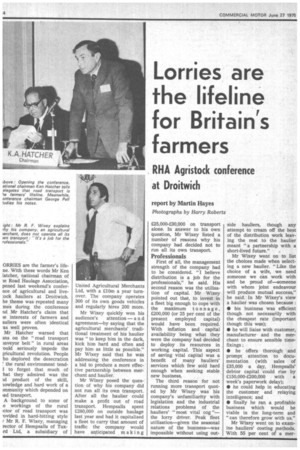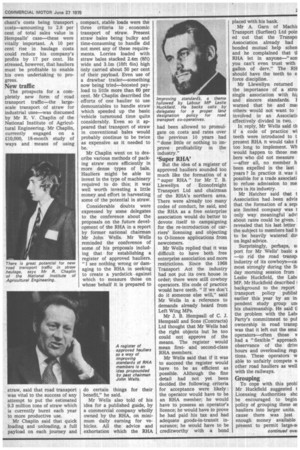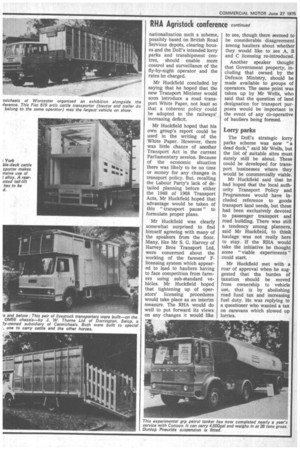Lorries are the lifeline for Britain's farmers
Page 26

Page 27

Page 28

If you've noticed an error in this article please click here to report it so we can fix it.
RHA Agristock conference
at Droitwich
report by Martin Hayes Photographs by Harry Roberts
ORRIES are the farmer's lifene. With these words Mr Ken [atcher, national chairman of le Road Haulage Association, pened last weekend's conferrice of agricultural and live:ock hauliers at Droitwich. he .theme was repeated many mes during the conference rid Mr Hatcher's claim that ie interests of farmers and auliers were often identical .as well proven.
Mr Hatcher warned that ins on the "road transport inveyor belt" in rural areas • ould seriously impede the ;ricultural revolution. People ho deplored the desecration ' the rural environment tend] to forget that much of hat they admired was the id product of the skill, lowledge and hard work of a immunity which depended on ad transport.
A background to some of e workings of the rural • ctor of road transport was -ovided in hard-hitting style r Mr R. F. Wixey, managing rector of Hempsalls of Tuxrd Ltd, a subsidiary of United Agricultural Merchants Ltd, with a £10m a year turnover. The company operates 300 of its own goods vehicles and regularly hires ,200 more.
Mr Wixey quickly won his audience's attention — a n d agreement—by saying that the agricultural merchants' traditional treatment of his haulier was "to keep him in the dark, kick him hard and often and pay him as little as possible." Mr Wixey said that he was addressing the conference in a bid to produce a more effective partnership between merchant and haulier.
Mr Wixey posed the question of why his company did not run all its own transport. After all the haulier could make a profit out of road transport. Hempsalls spent £280,000 on outside haulage last year and had it capitalised a fleet to carry that amount of traffic the company would have anticipated mak ing £25,000-£30,000 on transport alone. In answer to his own question, Mr Wixey listed a number of reasons why his company had decided not to run all its own transport.
Professionals
First of all, the management strength of the company had to be considered. "I believe distribution is a job for the professionals," he said. His second reason was the utilisation of capital. Mr Wixey pointed out that, to invest in a fleet big enough to cope with the maximum tonnage, £200,000 (or 25 per cent of the present employed capital) would have been required. With inflation and capital availability being what they were the company had decided to deploy its resources in working capital. This aspect of saving vital capital was a benefit of many hauliers' services which few sold hard enough when seeking stable new business.
The third reason for not running more transport quoted by Mr Wixey was his company's unfamiliarity with legislation and the industrial relations problems of the hauliers' " most vital cog "the lorry driver, Peak fleet utilisation—given the seasonal nature of the business—was impossible without using out side hauliers, though any attempt to cream off the best of the distribution work leaving the rest to the haulier meant "a partnership with a short-lived future."
Mr Wixey went on to list the choices made when selecting a new haulier. "Like the choice of a wife, we need someone we can work with and be proud of—someone with whom joint endeavour will produce mutual success," he said. In Mr Wixey's view a haulier was chosen because : • his business was efficient though not necessarily with the cheapest rate (important though this was); • he will liaise with customer, manufacturer and the merchant to ensure sensible timefixings ; II he offers thorough and prompt attention to documentation (with sales of £35,000 •a day, Hempsalls' debtor capital could rise by £150,000-£200,000 with a week's paperwork delay); • he could help in educating the customer and relaying intelligence; and • finally he ran a profitable business which would be viable in the long-term and "can therefore grow with us."
Mr Wixey went on to examine hauliers' costing methods. With 55 per cent of .a mer chant's costs being transport costs—amounting to 2.8 per cent of total sales value in Hempsalls' case—these were vitally important. A 10 per cent rise in haulage costs could reduce his company's profits by 17 per cent. He stressed, however, that hauliers must be profitable to enable his own undertaking to progress.
New traffic
The prospects for a completely new form of road transport traffic—the largescale transport of straw for industrial uses—was discussed by Mr R. V. Chaplin of the National Institute of Agricultural Engineering. Mr Chaplin, currently engaged on a £10,000, 18-month study of ways and means of using straw, said that road transport was vital to the success of any attempt to put the estimated 9.3 million tons of straw which is currently burnt each year to more productive use.
Mr Chaplin said that quick loading and unloading, a full payload on each journey and compact, stable loads were the three criteria to economic transport of straw. Present straw bales being bulky and time-consuming to handle did not meet any of these requirements. Lorries loaded with straw bales stacked 2.4m (8ft) wide and 3.1m (loft 6in) high only carried about 50 per cent of their payload. Even use of a drawbar trailer—something now being tried—boosted payload to little more than 60 per cent. Mr Chaplin described the efforts of one haulier to use demountables to handle straw which speeded up the basic vehicle turnround time quite considerably. Even so it appeared that transport of straw in conventional bales would probably continue to be twice as expensive as it needed to be.
Mr Chaplin went on to describe various methods of packing straw more efficiently in more dense types of bale. Hauliers might be able to invest in the type of machinery required to do this; it was well worth investing a little money and effort in harvesting some of the potential in straw.
Considerable doubts were expressed by some delegates to the conference about the proposals on the future development of the RHA in a report by former national chairman Mr John Wells. Mr Wells reminded the conference of some of his proposals including that • for establishing a register of approved hauliers. "I see nothing wrong or damaging to the RHA in seeking to create a yardstick against which to measure those on whose behalf it is prepared to do certain things for their benefit," he said.
Mr Wells also told of his idea for a published guide, by a commercial company wholly owned by the RHA, on minimum daily earning for vehicles. All the advice and exhortation which the RHA had been allowed to promulgate on costs and rates over the previous 10 years had "done little or nothing to improve profitability in the industry."
'Super RHA'
But the idea of a register of approved hauliers sounded too much like the formation of a "super RHA" for Mr T. B. Llewellyn of Econofreight Transport Ltd and chairman of the RHA's northern area. There were already too many codes of conduct, he said, and the RHA as a free enterprise association would do better to devote itself to campaigning for the re-introduction of carriers' licensing and objecting to 0-licence applications from newcomers.
Mr Wells replied that it was difficult to have both free enterprise association and more restrictions. Since the 1968 Transport Act the industry had not put its own house in order; there were still cowboy operators. His code of practice would have teeth. "If we don't do it someone else will," said Mr Wells in a reference to demands already heard from Left Wing MPs.
Mr J. B. Hempsall of C. J. Hempsall and Sons (Contracts) Ltd thought that Mr Wells had the right objects but he too could not approve of the means. The register would mean firstand second-class RHA members.
Mr Wells said that if it was to succeed the register would have to be as efficient as possible. Although the fine detail had not yet been decided the following criteria for acceptance were likely : the operator would have to be an RHA member; he would have to possess an operator's licence; he would have to prove he had paid his tax and had adequate goods-in-transit insurance; he would have to be creditworthy with a bond placed with his bank Mr A. Garn of Machii Transport (Surfleet) Ltd poin ed out that the Transpo Association already had bonded mutual help schen and he complained that ti RHA let in anyone—" son you can't even trust with gallon of derv." The RI-I should have the teeth to e force discipline.
Mr Llewellyn returned the importance of a stroi single association with hii and sincere standards. I warned that he and mai others would not want to involved in an Associatil effectively divided in two.
In reply, Mr Wells said th if a code of practice wi teeth were introduced to t present RHA it would take f too long to implement. Wh would happen to those me] bers who did not measure —after all, no member h been expelled in the last years'? In practice it was i: possible for a trade associati to refuse admission to me: bers in its industry.
Mr Hatcher said that t Association had . been advis that the formation of a sepi ate limited company was t only way meaningful advi about rates could be given. : revealed that his last letter the subject to members had Ii to be heavily watered do' on legal advice.
Surprisingly, perhaps, si port for Mr Wells' basic a —to rid the road transpt industry of its cowboys—cal most strongly during the Si day morning session from Leslie Huckfield, the Lab( MP. Mr Huckfield described I background to the report transport policy publist earlier this year by an in pendent study group uni his chairmanship. He said ti the problem with the Labt Party's commitment to put ownership in road transp was that it left out the smal operators—often those v had a " flexible " approach observance of the drivt hours and overloading regt tions. These operators w able to unfairly compete vk other road hauliers as well with the railways.
Grouping
To cope with this probl Mr Huckfield suggested t Licensing Authorities sho be encouraged to begin policy of grouping these sr hauliers into larger units. cause there was just enough money available present to permit large-s] nationalisation such a scheme, possibly based on British Road Services depots, clearing houses and the DoE's intended lorry parks and transhipment centres, should enable more control and surveillance of the fly-by-night operator and the rates he charged.
Mr Huckfield concluded by saying that he hoped that the new Transport Minister would soon introduce a road transport White Paper, not least so that a coherent policy could be adopted to the railways' increasing deficit.
Mr Huckfield hoped that his own group's report could be used in the writing of the White Paper. However, there was little chance of another Transport Act in the current Parliamentary session. Because of the economic situation there was likely to be no time or money for any changes in transport policy. But, recalling the Labour Party's lack of detailed planning before either the 1948 of 1968 Transport Acts, Mr Huckfield hoped that advantage would be taken of this " transport pause" to formulate proper plans.
Mr Huckfield was clearly somewhat surprised to find himself agreeing with many of the speakers from the floor. Many, like Mr S. G. Harvey of Harvey Bros Transport Ltd, were concerned about the working of the farmers' Flicensing system which appeared to lead to hauliers having to face competition from farmers using sub-standard vehicles. Mr Huckfield hoped that tightening up of operators' licensing procedures would take place as an interim measure. The RHA would do well to put forward its views on any changes it would like to see, though there seemed to be considerable disagreement among hauliers about whether they would like to see A, B and C licensing re-introduced.
Another speaker thought that Government property, including that owned by the Defence Ministry, should be made available to groups of operators. The same point was taken up by Mr Wells, who said that the question of land designation for transport purposes would be important in the event of any co-operative of hauliers being formed.
Lorry parks
The DoE's strategic lorry parks scheme was now "a dead duck," said Mr Wells, but the list of suitable sites must surely still be about. These could be developed for transport businesses where they would be commercially viable.
Mr Huckfield said that he had hoped that the local authority Transport Policy and Programmes would have included reference to goods transport land needs, but these had been exclusively devoted to passenger transport and road building. There was still a tendency among planners, said Mr Huckfield, to think haulage was not really here to stay. If the RHA would take the initiative he thought some "viable experiments" could start.
Mr Huckfield met with a roar of approval when he suggested that the burden of taxation should be moved from ownership to vehicle use, that is by abolishing road fund tax and increasing fuel duty. He was replying to a questioner who wanted a tax on caravans which slowed up lorries.




















































































